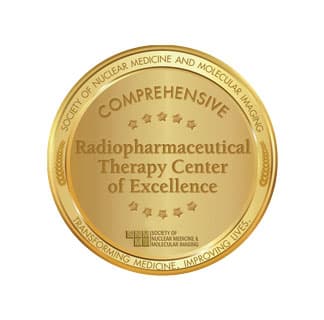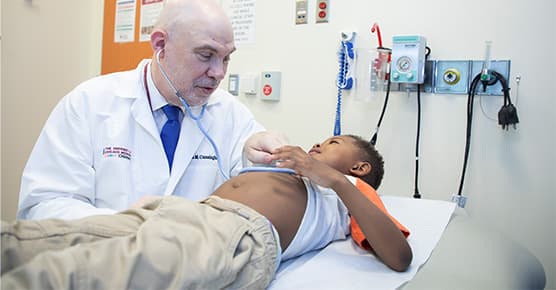MIBG Therapy for Neuroblastoma
The University of Chicago Medicine Comer Children's Hospital is the first medical center in Illinois to offer I131-MIBG therapy. I131-MIBG therapy is one step in a complex treatment plan for children with relapsed or difficult-to-treat neuroblastoma and is also being tested in newly diagnosed high-risk neuroblastoma patients.
Parents play an important role in caring for children receiving this unique therapy. We've prepared this information to help answer some of the questions you may have about the treatment.
What To Know About MIBG Therapy
MIBG stands for meta-iodobenzylguanidine — a molecule that is actively absorbed by neuroblastoma cells. When radioactive iodine is attached to MIBG, the combination is referred to as I131-MIBG.
During the treatment, I131-MIBG (a clear liquid that looks like water) is administered to the patient through a central line. The infusion is painless and takes between 90 minutes and two hours. MIBG carries the radioactive iodine directly to the neuroblastoma cells. The tumor cells take up the MIBG and radiation. The radioactive iodine then attacks the cancer cells, shrinking the tumor.
After the radiation reaches the tumor, it leaves the child's body through bodily fluids (e.g. urine, saliva, skin secretions) over a few days. The child must be hospitalized and remain in bed with a catheter to collect urine during this time period. The typical hospital stay is three to five days.
While radiation can be effective in shrinking tumors and destroying cancer cells, it can also damage healthy tissue. Because I131-MIBG therapy is a radioactive medication, a designated room and specific equipment are necessary when delivering the therapy.
The I131-MIBG therapy room is a special hospital room built with lead-lined walls and doors. Large mobile lead shields are positioned around the child's bed. (Because lead is a thick, dense material, it stops, or absorbs, almost all of the radiation from radioactive iodine.)
For further protection, most of the surfaces and equipment in the room are covered with plastic during the treatment.
Parents can prepare for this special hospitalization by:
- Talking to your child about what to expect
- Preparing your child to sleep alone in a bed
- Meeting with our child life specialist
- Planning for your child's comfort and entertainment while in isolation
Medical staff and parents are required to follow strict guidelines in order to control their exposure to radiation. Because the I131-MIBG medical team cares for many patients who receive this therapy, they must limit their time with each child in order to avoid too much exposure to radiation. For this reason, parents are the primary caregivers during their child's stay in the I131-MIBG therapy room. Prior to their child's hospitalization, parents will complete special training. One parent must be available at all times to assist with the child's daily care. At first, parents will have very limited time in the room. As the radiation level decreases each day, our radiation safety experts will determine how much additional time the primary caregiver can spend in the room.
An anteroom next to the I131-MIBG therapy room allows parents and children to communicate through closed circuit TV and iPads. A family room, which sleeps two, is located next door.
The I131-MIBG medical team at Comer Children's takes great care and consideration when providing this leading-edge therapy to our patients. Everyone on the team has had special training in how to safely give I131-MIBG therapy. Our multidisciplinary team includes:
- Oncologists
- An advanced practice oncology nurse
- Nuclear medicine physicians and technicians
- Radiation safety experts
- Radiopharmacists
- Child life specialists
- Social workers

Comprehensive Radiopharmaceutical Therapy Center of Excellence
UChicago Medicine is the first and only hospital in Illinois to earn the Comprehensive Radiopharmaceutical Therapy Center of Excellence designation from the Society of Nuclear Medicine & Molecular Imaging. This achievement recognizes UChicago Medicine as a leader in this growing field, and our commitment to providing the highest level of care and research.
Learn more about this important designation


